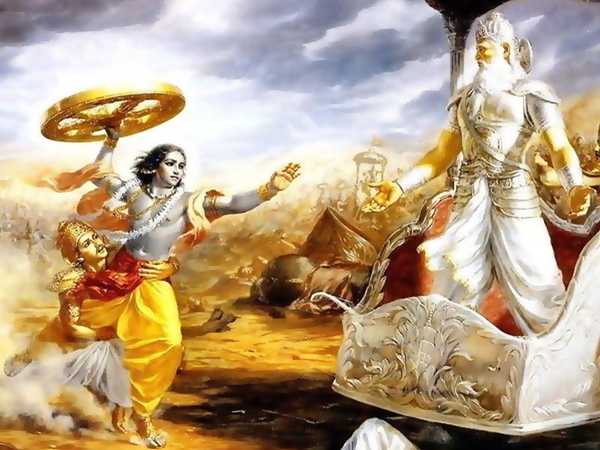Chapter 40

“Saunaka said, ‘O son of Suta, I desire to know the reason why theillustrious Rishi whom thou hast named Jaratkaru came to be so called onearth. It behoveth thee to tell us the etymology of the name Jaratkaru.’
“Sauti said, ‘Jara is said to mean waste, and Karu implies huge. ThisRishi’s body had been huge, and he gradually reduced it by severe asceticpenances. For the same reason, O Brahmanas, the sister of Vasuki wascalled Jaratkaru.’
The virtuous Saunaka, when he heard this, smiled and addressingUgrasravas said, ‘It is even so.’
Saunaka then said, ‘I have heard all that thou hast before recited. Idesire to know how Astika was born.’
Sauti, on hearing these words, began to relate according to what waswritten in the Sastras.
“Sauti said, ‘Vasuki, desirous of bestowing his sister upon the RishiJaratkaru, gave the snakes (necessary) orders. But days went on, yet thatwise Muni of rigid vows, deeply engaged in ascetic devotions, did notseek for a wife. That high-souled Rishi, engaged in studies and deeplydevoted to asceticism, his vital seed under full control, fearlesslywandered over the whole earth and had no wish for a wife.
“Afterwards, once upon a time, there was a king, O Brahmana, of the nameof Parikshit, born in the race of the Kauravas. And, like hisgreat-grandfather Pandu of old, he was of mighty arms, the first of allbearers of bows in battle, and fond of hunting. And the monarch wanderedabout, hunting deer, and wild boars, and wolves, and buffaloes andvarious other kinds of wild animals. One day, having pierced a deer witha sharp arrow and slung his bow on his back, he penetrated into the deepforest, searching for the animal here and there, like the illustriousRudra himself of old pursuing in the heavens, bow in hand, the deer whichwas Sacrifice, itself turned into that shape, after the piercing. No deerthat was pierced by Parikshit had ever escaped in the wood with life.This deer, however wounded as before, fled with speed, as the (proximate)cause of the king’s attainment to heaven. And the deer thatParikshit–that king of men–had pierced was lost to his gaze and drewthe monarch far away into the forest. And fatigued and thirsty, he cameacross a Muni, in the forest, seated in a cow-pen and drinking to hisfill the froth oozing out of the mouths of calves sucking the milk oftheir dams. And approaching him hastily, the monarch, hungry andfatigued, and raising his bow, asked that Muni of rigid vows, saying, ‘OBrahmana, I am king Parikshit, the son of Abhimanyu. A deer pierced by mehath been lost. Hast thou seen it?’ But that Muni observing then the vowof silence, spoke not unto him a word. And the king in anger thereuponplaced upon his shoulder a dead snake, taking it up with the end of hisbow. The Muni suffered him to do it without protest. And he spoke not aword, good or bad. And the king seeing him in that state, cast off hisanger and became sorry. And he returned to his capital but the Rishicontinued in the same state. The forgiving Muni, knowing that the monarchwho was a tiger amongst kings was true to the duties of his order, cursedhim not, though insulted. That tiger amongst monarchs, that foremost oneof Bharata’s race, also did not know that the person whom he had soinsulted was a virtuous Rishi. It was for this that he had so insultedhim.
“That Rishi had a son by name Sringin, of tender years, gifted with greatenergy, deep in ascetic penances, severe in his vows, very wrathful, anddifficult to be appeased. At times, he worshipped with great attentionand respect his preceptor seated with ease on his seat and ever engagedin the good of creatures.
“And commanded by his preceptor, he was coming home when, O best ofBrahmanas, a companion of his, a Rishi’s son named Krisa in a playfulmood laughingly spoke unto him. And Sringin, wrathful and like untopoison itself, hearing these words in reference to his father, blazed upin rage.’
“And Krisa said, ‘Be not proud, O Sringin, for ascetic as thou art andpossessed of energy, thy father bears on his shoulders a dead snake.Henceforth speak not a word to sons of Rishis like ourselves who haveknowledge of the truth, are deep in ascetic penances, and have attainedsuccess. Where is that manliness of thine, those high words of thinebegotten of pride, when thou must have to behold thy father bearing adead snake? O best of all the Munis, thy father too had done nothing todeserve this treatment, and it is for this that I am particularly sorryas if the punishment were mine.'”




